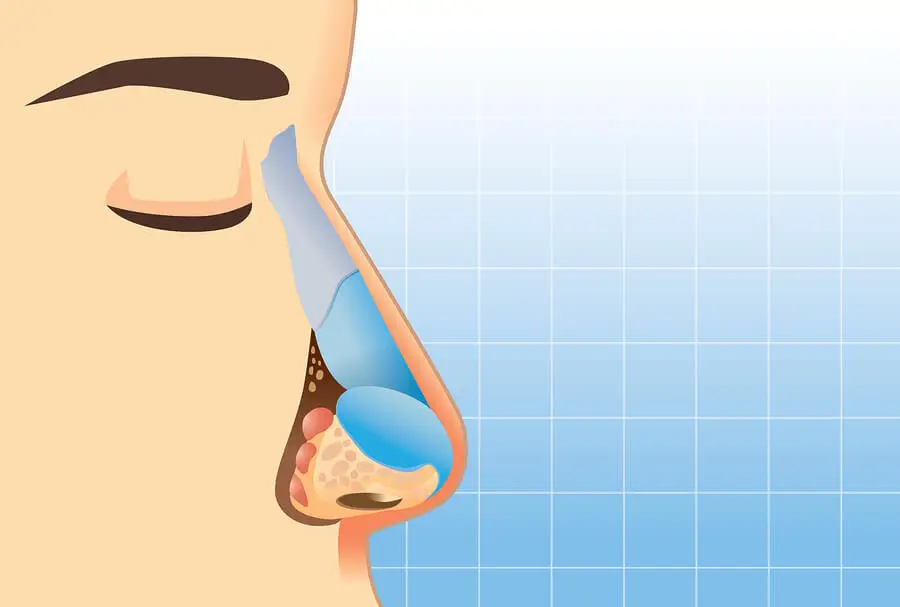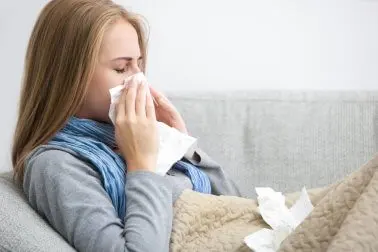Why Do We Get Sicker in the Winter? A Study Reveals New Details


Reviewed and approved by the doctor Leonardo Biolatto
It’s a fact that people get sick more in winter than in other seasons. A recent study reveals unpublished details about it.
Scientists have always believed that when temperatures drop, viruses like the flu have a greater impact because we cluster indoors. This means that if one has already acquired the disease, it’s more easily transmitted among others.
However, what researchers from the team at Massachusetts Eye and Ear Hospital and Northeastern University suggest is that there are also biological reasons behind the phenomenon. Want to know more? Keep reading!
Cold seasons affect the nose’s immune response
The findings of the study we are quoting point to the fact that we get sicker in winter because low temperatures significantly affect the nose’s immune response. When there’s a virus such as the flu virus in the environment, its particles can enter through this organ in two different ways:
- By inhalation
- By direct contact
The nose is one of the first points of contact between the outside world and the inside of the body. -Dr. Benjamin Bleier, co-author of the study published in The Journal of Allergy and Clinical Immunology
Back in 2018, Dr. Bleier himself and a team of scientists discovered that, when cells in the front of the nose detect bacteria, they release billions of tiny sacs containing fluid. Known as extracellular vesicles (EVs), they move quickly into the mucus to surround and attack bacteria before they have a chance to infect.
Practically, their function is to kill bacteria before they can infect you and make you sick. It was this discovery that led the group of scientists to investigate further.
This led our team to analyze whether this same response occurred with some of the viruses that cause common upper respiratory infections, such as the common cold. -Dr. Bleier

We think you may also enjoy reading this article: 7 Natural Ways to Boost Your Immune System and Prevent Colds and the Flu
Why do we get sicker in the winter? EV quality decreases with cold
Hypothesizing that the nasal immune response is compromised with cold, Bleier and his team began new research.
To test their approach, they exposed nasal tissues to temperatures of 39.9 degrees Fahrenheit (4.4 degrees Celsius). They found that this led to a decrease of about 9 degrees Fahrenheit (5 degrees Celsius) in tissue temperature, affecting the immune system. The drop significantly reduced their innate immune response.
The number of EVs they released under these conditions decreased by more than 40% and their quality was affected. The reduced response would make the virus more able to attach to nasal cells.
This is the first study to consider a biological explanation
For many years, it’s been taken as a given that we get sicker during the winter. However, this study is the first to address biological factors to explain why.
Bleier and his team consider their findings to be very significant. To their knowledge, this study is the first to offer a biological explanation for the phenomenon and serves as a basis for understanding and preventing upper respiratory tract infections such as colds, the flu, and COVID-19.
Most importantly, the nasal cells used were donated by volunteers and grown in a laboratory.
That is, people did not have to be directly exposed to the viruses. The natural conditions inside the nose were simulated. In addition, there were temperature variations to better observe the changes in the immune response.
For the time being, progress is awaited in the experimentation on volunteers to ratify more strongly the hypothesis put forward, if the response turns out to be the same as the simulated one. However, it’s already a breakthrough in the control of common winter respiratory diseases.

Like this article? You may also like to read: Don’t Touch These Four Body Parts without Washing Your Hands
Despite advances, preventive measures against the flu are still in effect
According to the Cleveland Clinic, influenza is an infection of the upper respiratory system that affects the nose, mouth, throat, and lungs. Symptoms vary from person to person, but there are some that are recurrent:
- A fever
- Sneezing
- Watery eyes
- Runny nose
- Headaches
- Body aches
- Fatigue and exhaustion
- Cough and sore throat
- Chills and sweating
- Nausea and loss of appetite
The flu has no specific cure, but a number of medications are available to relieve symptoms.
There is a vaccine that is given preventively against influenza, which comes as an injection or nasal spray. Its method is to expose the body to the attenuated virus so that the body develops antibodies.
In addition to applying the vaccine and following the proposed medical scheme, it’s essential to wash your hands frequently for prevention. It’s also important to eat healthy, exercise, and hydrate properly.
All cited sources were thoroughly reviewed by our team to ensure their quality, reliability, currency, and validity. The bibliography of this article was considered reliable and of academic or scientific accuracy.
- Benjamin S. Bleier; Di Huang; Maie S. Taha; Ángela L. Nocera; Anan D. Workman; Mansoor M. Amiji. Cold exposure impairs extracellular vesicle swarm–mediated nasal antiviral immunity. The Journal of Allergy and Clinical Immunology. 2022. DOI:https://doi.org/10.1016/j.jaci.2022.09.037
This text is provided for informational purposes only and does not replace consultation with a professional. If in doubt, consult your specialist.








